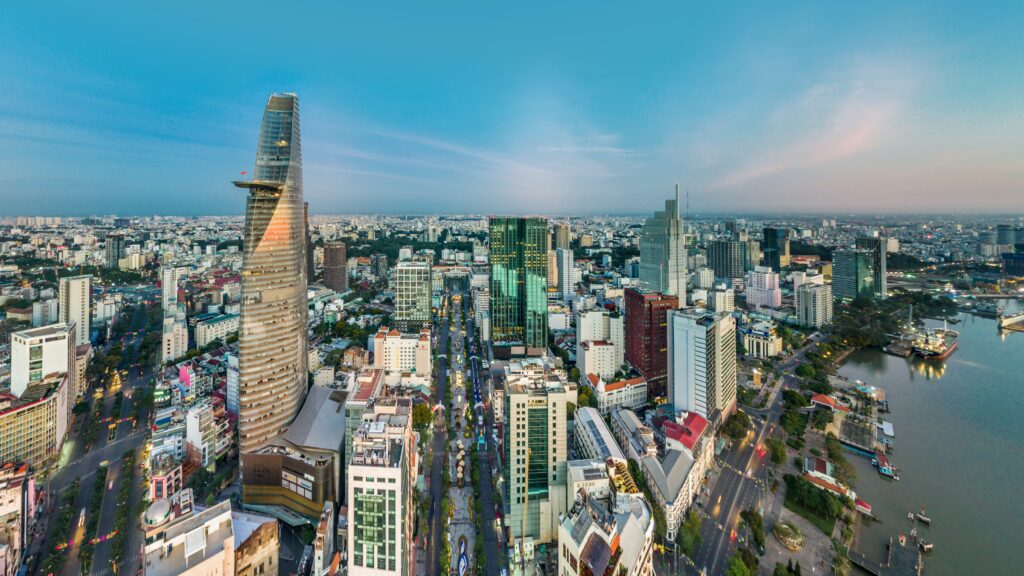Finally, a light at the end of the Covid-19 tunnel for those of us keen to get on a plane ASAP! With months of uncertainty and disappointment with holidays cancelled and tans missed, we’ve been working hard to make sure our teachers have something to look forward to. Our partner schools in Vietnam are now ready and waiting for English teachers to start their new adventures – could it be you?
Life in Vietnam
One of the highlights of a country like Vietnam is how much variation there is between the cities, and each city has its own pros and cons, as well as (more importantly) its own cuisine. Our main placements are in Ho Chi Minh City (also known as Saigon) and Hanoi, as they attract many expats looking for a new experience, good weather and great food. However, whichever city you end up in, there are some things you can count on. One of the big temptations of relocating to Vietnam is the low cost of living, even in the most popular cities, such as Ho Chi Minh City and Hanoi. Consequently, your teaching wage will allow you to live a comfortable life whilst also saving some VND too, if you want. Many teachers chose to engage in the active social life that this lifestyle allows, with spare money for lots of dinners out, evenings in the bar and days out enjoying the different landscapes of Vietnam.

Hanoi
The capital of Vietnam, it’s nearly impossible to get bored in Hanoi. Similar to the Vietnam you see in the movies, Hanoi is home to numerous markets, clubs and a variety of different architecture. A well-balanced mix of new and old, the city has undergone vast economic growth in recent history, whilst still maintaining national traditions and preserving historic buildings, parks and memorials.
Another selling point for Hanoi is the seasonal weather, with summers getting up to 38 degrees and spring being a comfortable and pleasant temperature. The changing weather lends itself to many different days out.
We’ve also done some research on the best ways to unwind, so make sure to check out Ho Chi Minh Mausoleum, Dong Xuan Market and, after a busy day and when you’re craving some beer from any number of makeshift street bars, Bia Hoi Junction (known amongst the local expats as ‘Beer Street’).
Ho Chi Minh City
 Further South, Ho Chi Minh City boasts tropical weather year round. There is some variation though, as the city has both wet and dry seasons. If it gets too hot for you, don’t worry as the city also operates as a major transportation hub, so it’s easy to get somewhere cooler in your spare time. Whilst both Hanoi and Ho Chi Minh City have influences from French culture, this is more evident in Ho Chi Minh as many older locals are able to speak both Vietnamese and French.
Further South, Ho Chi Minh City boasts tropical weather year round. There is some variation though, as the city has both wet and dry seasons. If it gets too hot for you, don’t worry as the city also operates as a major transportation hub, so it’s easy to get somewhere cooler in your spare time. Whilst both Hanoi and Ho Chi Minh City have influences from French culture, this is more evident in Ho Chi Minh as many older locals are able to speak both Vietnamese and French.
As the biggest city in Vietnam, there are many temples, museums and bars to keep you busy. A few of our favourites are Cao Dai Temple, The Reunification Palace and The Rooftop Bar for an impressive view of the city skyline.
In the Classroom
Vietnamese culture is very visible when in the classroom, which is good news for us, as it gives a truly authentic experience to our teachers. Family is a key part of Vietnamese life, and you’ll notice parents being a real driving-force for their children’s learning. Luckily for us, speaking and communicating in English is viewed as a skill that will open many doors for your students, so there is a real emphasis on teaching English and plenty of job opportunities. You’ll see this in any meetings with parents, and the pride the students take in their own work.
parents being a real driving-force for their children’s learning. Luckily for us, speaking and communicating in English is viewed as a skill that will open many doors for your students, so there is a real emphasis on teaching English and plenty of job opportunities. You’ll see this in any meetings with parents, and the pride the students take in their own work.
As a collectivist culture, students in a Vietnamese classroom may react differently to students in a Western classroom. It can be less commonplace for students to openly volunteer answers, and you may need to adopt the ‘cold-calling’ approach where you choose a student to answer a question or share their work. Don’t take this personally, or interpret this as disengagement, as they are simply waiting for you to pick someone! Just as in any Western classroom, but even more so in Vietnam, give the class time to warm-up to you and get to know you. There is a lot of respect for teachers in Vietnam, and it is natural for your class to be a little nervous at first when they have a new teacher – make sure to give lots of praise, and be aware that students may be embarrassed if they get a question wrong or are told-off in front of their class.
An important side note: You’ll also notice that your students will call you ‘teacher’ rather than by your surname or given name. Keep in mind that just as it may be difficult for you to use Vietnamese names, your students may struggle to use your English name. It may seem a little strange at first, but it is not meant disrespectfully and it’s surprising how quickly this feels normal!
Getting Started
The pleasant weather, traditional street food and low cost of living attracts many expats to Vietnam; however, the high demand means there is still plenty of opportunity to get out there and experience it all for yourself! Our partner schools are ready to start recruitment now, and with a relatively quick visa process, taking around 2-3 months, you could be in the classroom (or walking ‘Beer Street’) in the very near future.
Our Vietnam program is currently on hold, but we offer programs in China, Thailand, Poland, an
About the author





